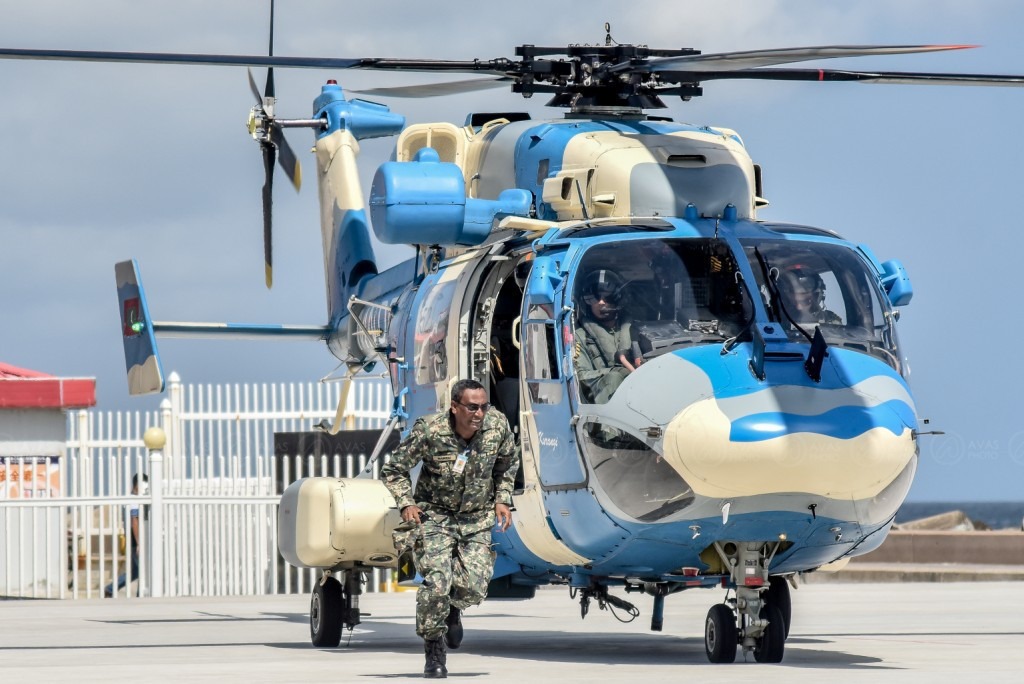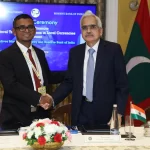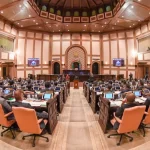In a significant move, President Dr. Mohammed Muizzu has decided today, to reinstate helicopter flight operations in the county, following discussions within the cabinet regarding a proposal presented by the Ministry of Transport and Civil Aviation. The primary objective is to bolster emergency services in the islands, with a specific focus on refining Medivac and Search and Rescue operations. The initiation of helicopter operations will prioritize safety and operational efficiency.
A consequential outcome of this decision is the mandatory provision of Medivac and Search and Rescue services, utilizing twin engine helicopters. Currently, the Indian military deploys two HAL Dhruv helicopters in the Maldives for search and rescue missions, as well as medical evacuations for the island nation. Notably, more than 300 twin engine Dhruv helicopters are currently operational with the Indian Defence Forces.

The government’s strategic choice is likely influenced by considerations of reliability and adherence to safety standards. Additionally, the President has directed that public flights, excluding emergency services, must be exclusively operated from approved heliports.
To implement this directive, measures will be taken to allocate space for a heliport at Vellana International Airport. Provisions will also be made to establish a heliport in another area if deemed necessary, demonstrating a comprehensive approach to infrastructure development to ensure the aviation landscape is suitably equipped for helicopter operations.
In response to today’s Cabinet discussion, the President has taken the initiative to revise the structure of the Civil Aviation Authority, aiming to streamline and enhance the regulatory framework governing aviation activities, underscoring a commitment to safety and efficiency.
Another significant aspect of the decision involves the formulation of a salary structure within the Civil Aviation Authority. The goal is to attract technically qualified individuals from the industry and incentivize their retention in the field, recognizing the critical role of skilled personnel in maintaining and advancing civil aviation standards.
While the reintroduction of helicopter services primarily focuses on improving emergency response capabilities, the decision also reflects a broader strategy to modernize and optimize the aviation sector in the Maldives. The proposed changes, including heliport development and structural reforms, suggest a concerted effort to align the country’s aviation infrastructure with international standards and best practices.
To reintroduce helicopters, a British research team conducted a feasibility study in August 2017, carried out from the 4th to the 11th of the mentioned month.
It’s noteworthy to mention the historical context of helicopter services in the Maldives, beginning with the inception of Hummingbird Island Helicopters in 1989. Two accidents occurred during their operations. The company underwent a series of changes, transitioning from a fleet of helicopters to Hummingbird Island Airways, and finally evolving into Trans Maldivian Airways (TMA) with a seaplane-only fleet in 1999.

It’s noteworthy to mention the historical context of helicopter services in the Maldives, starting with the inception of Hummingbird Island Helicopters in 1989. Two accidents occurred during their operations. The company underwent a series of changes, transitioning from a fleet of helicopters to Hummingbird Island Airways, and finally evolving into Trans Maldivian Airways (TMA) with a seaplane-only fleet in 1999.











